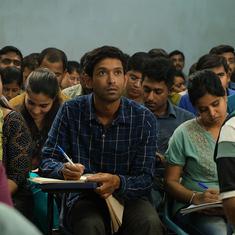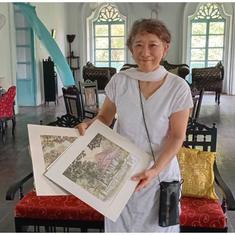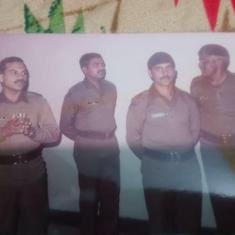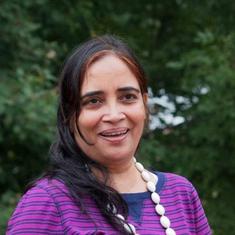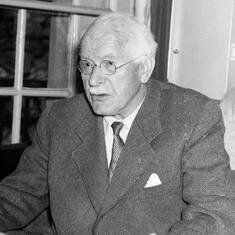The sky was resplendent now. Tufts of clouds stained themselves in colour snatched from the gradually setting sun. The scattered clusters, big and small, looked like the strewn remains of a crushed, ripe papaya.
Paridhi was leaning against a bamboo post on the long verandah in front of the house with a sloping roof. Her eyes were fixed on the sky. Despite its magnificence today as it stood on the threshold of evening, she always felt sad at this time of the day. Sure, the sky would be speckled with myriad bright stars soon, but without the sun she felt like an orphan – abandoned. She could not explain this affinity to the sun. When it left for the day, she felt it took away a part of her with it. An intense weariness then overcame her.
She had spent the day painting on pebbles without a break. After a long time, she was able to concentrate on doing something she loved. These days she had to spend a lot of time with her bordeuta, the elder brother of her father. If he did not see Paridhi even for a little while, he called out loudly for her. How much could her mother manage on her own? She was on her toes moving from one room to another, from the kitchen to the bedroom, throughout the day. The old pain in her waist surfaced quite frequently these days. Now there was the additional work of looking after her elder brother-in-law. So Paridhi attended to his demanding call promptly, even if she was busy with other chores.
Paridhi’s heart filled with sadness. At one time, she used to hold bordeuta’s hand with great faith that she would always be safe with him standing by her side. And now, his hand sought hers. Lately, he had become quite weak and needed assistance to manage even the most ordinary tasks. If he walked a little more than usual, his head would spin and he needed someone by his side to lean on. He even found it difficult to get up from the bed on his own.
There was a time when he, Bordeuta, proudly proclaimed that he would never be under anybody’s obligation but now, finding himself helpless, he often lost his temper. He ground his teeth in frustration when he could not button up his shirt with his trembling fingers.
Paridhi straightened up. She felt a pain climbing down her neck to her back. It could be because she had been bent over the stones for many hours at a stretch only taking a break only a couple of times to check on her uncle. Today, thankfully, he had not asked for her constantly. He seemed tired, physically and mentally.
The sweet smell of dhuna assailed her nose. She turned her head to see her mother and said, “Ma, perhaps bordeuta is not very well today. Did he eat properly?”
“Not really. I served him a small amount but even then, he didn’t finish it all.”
“Did you give him the medicines on time?”
“Yes, I did.”
Her mother stepped down to the courtyard with the earthen pot in which the incense was burning. Facing the gate at the entrance of the house, she bowed reverently to the approaching evening. Paridhi’s eyes too closed automatically in a prayer. She knew that her god and her mother’s god were not the same. Even then, at these moments, somehow their minds converged. A growing sense of foreboding, as if an ancient tree nearby was about to be uprooted, made both of them bow to some unknown force.
Her mother now went into the inner quarters. With a strange sadness that assailed her, Paridhi walked towards her uncle’s room. This big house, once full of people, had only three inhabitants now.
“Are you asleep, bordeuta?”
“No. Pari, where were you all this time? I called you so many times.”
“I was in the front verandah. That’s why I didn’t hear you. Why did you call me?”
“Why did I call you? Oh…you see…I’ve forgotten.”
“It’s all right. You tell me when you remember,” Paridhi replied.
Sitting on the bed, she started giving him a forehead massage. Her uncle asked her if she had locked the doors properly. She assured him that she had. She knew what would follow now. He would warn her that these days things were not the same. People did not feel safe even during the day. Nobody could be trusted. Then he would mumble, “We were much better off in our day” and reminisce. Even with that voice, now weakened by age and illness, he would go on and on, describing many things – his childhood, adolescence, a youth full of many happy tones. He would lose track in between and Paridhi would help him recall.
Her uncle’s words were like stories.
Paridhi still loved listening to stories. At one time, her uncle had told her stories of kings and his subjects. The tales about mythical kings and their courtesans would eventually stream into stories of historical figures of royalty and the various court intrigues. Paridhi sometimes felt bored. She would rather listen to stories about the water princess but did not interrupt him.

Excerpted with permission from Beneath the Simolu Tree, Sarmistha Pritam, translated from the Assamese by Ranjita Biswas, Simon and Schuster India.

